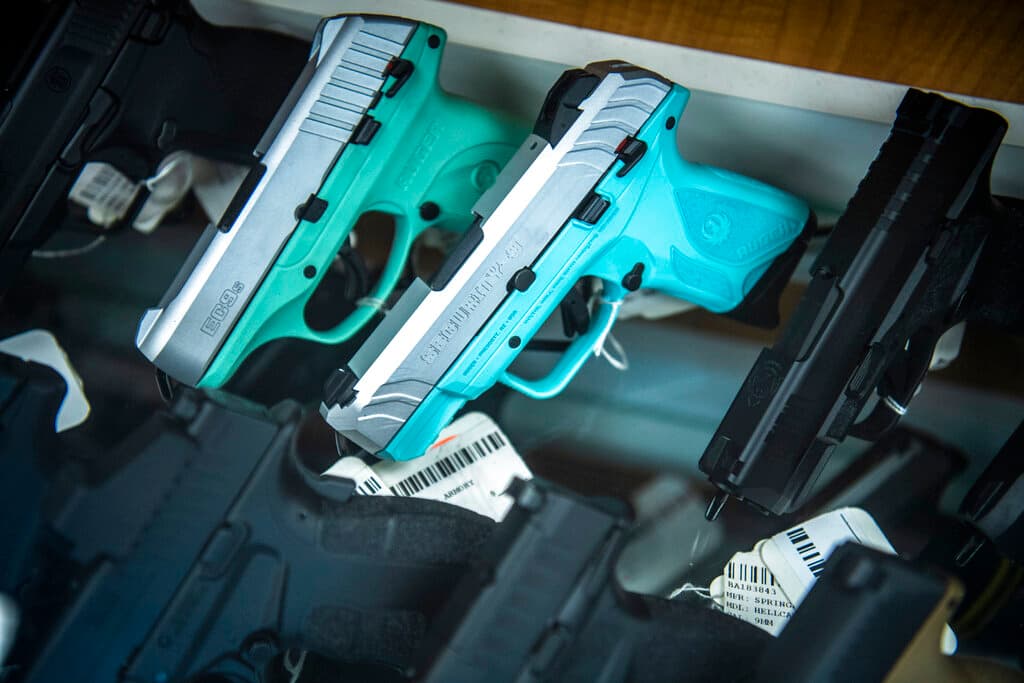More Americans Hold Concealed Carry Permits Than Ever Before
Rising crime, pro-Second Amendment rulings from the Supreme Court, and an increasing number of states adopting Constitutional carry laws have led to more Americans being issued permits than ever before.

A record number of Americans either hold or have applied for permits to carry concealed weapons in public in the United States in 2022, according to a new report, a number that has increased more than seven-fold since 1999.
The annual Concealed Handgun Permit Report, issued by the pro-Second Amendment Crime Prevention Research Center, found that the number of permits issued increased at a rate of 2.3 percent last year. According to the report, at least two percent of the population holds a concealed carry permit in 45 of 50 states.
Some 17 states have issued licenses to at least five percent of their respective populations. In Alabama, Colorado, Georgia, Indiana, and Iowa, that figure is at least 15 percent. In Wisconsin, the number of concealed carry permits increased to nearly 329,000 in 2017 from under 40,000 in 2011. As of October, 2022, the number is 468,000.
Nationwide, around 22 million Americans now hold concealed carry permits. This comes amid rising crime rates, and Second Amendment rights advocates’ recent victories at the Supreme Court and in state legislatures.
States that track gender and race of permit applicants show a disproportionate increase in the number of women and minorities applying for permits. Almost 30 percent of applicants in the 15 states that track gender were women, according to the report, and eight times as many black females in Texas applied for permits than white males between 2002 and 2021.
Last summer, the Supreme Court struck down a New York law that limited the issuance of concealed carry permits. In the case, New York State Rifle & Pistol Association v. Bruen, the court struck down the state’s requirement that applicants show “proper cause” for obtaining a license.
Writing for the majority, Associate Justice Clarence Thomas said that the state’s requirement violated the applicants’ 14th Amendment right to equal protection. The decision is groundbreaking with respect to “shall issue” versus “may issue” statutes.
Associate Justice Brett Kavanaugh wrote a concurring opinion in which he said background checks, training, and fingerprinting are permissible under the Constitution, but the discretionary nature of “may issue” laws is not.
Following the Bruen decision, only two states maintained their “may issue” regulations, meaning that states are permitted to deny applications even if applications complete training and background check requirements.
The Court’s ruling was a landmark victory for Second Amendment advocates. According to the New York Police Department, about 50 percent of this year’s applications were filed in the weeks following the Bruen decision. Maryland, Hawaii, and San Francisco also saw a notable increase in applications.
While the Bruen ruling had a dramatic impact on “may issue” statutes and permitting, the Second Amendment rights movement has seen most of its success in state legislatures over the past decade.
At least 25 states have passed permitless carry laws — sometimes called “Vermont carry.” It means that citizens are not required to hold permits to carry firearms, openly or concealed. These laws have taken effect in 24 states, with Alabama’s going into effect in January. North Dakota allows for permitless carry, but only for residents.
Given that half of states do not require permits for gun ownership or concealed carry, the authors of the concealed handgun report said it can be assumed that many millions more Americans own or carry weapons without their respective state’s knowledge.
Despite liberalization in some states, others are seeing further restrictions on gun permitting and ownership. In Oregon, a ballot measure that would require permitting and background checks as well as a ban on magazines with more than 10 rounds passed by just 29,000 votes out of nearly 2 million cast in the midterm election earlier this month.
The adoption of Measure 114, which takes effect in a few weeks, led to a 400 percent increase in permit applications. “It’s restricting normal citizens from owning normal things,” one resident told FOX12 Oregon.
In Michigan, where Governor Whitmer just won another four-year term and Democrats took control of the state legislature, gun law reform is likely to take center-stage in the coming legislative session.
In an interview with MichiganLive, the governor said that winning control of the state legislature has made gun control laws possible. “These [gun laws] were a nonstarters with the former legislature,” Ms. Whitmer said. She said her legislative priorities include mandating proper storage and enacting comprehensive background checks.

